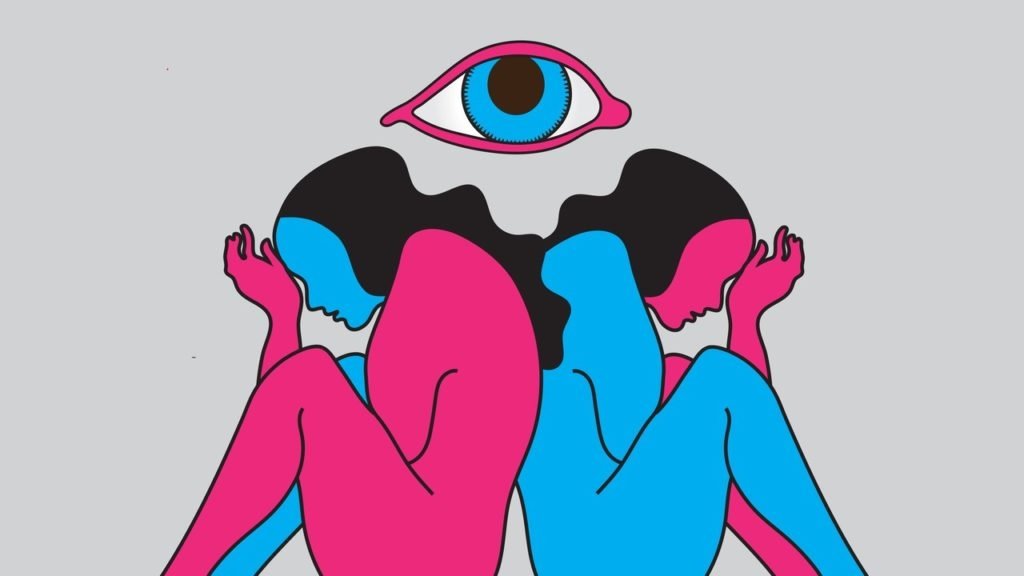TW: Physical, emotional and sexual abuse
In a patriarchal society, men and women are involved in a superior-subordinate relationship. This hierarchical relationship is preserved, and often reproduced in conventional romantic relationships as well. Consequently, male partners are allowed to exert their dominance in a number of ways, which is dubbed as ‘normal’.
The exertion of male superiority in romantic relationships can be subtle like restricting the freedom or autonomy of women or explicit like physical abuse. This gives rise to potentially three kinds of abuses – physical, emotional and sexual. However, these are not mutually exclusive, since most of the time they overlap each other. In this light, we have tried to explore the dimension of abuse in romantic relationships that female students have had with male students in their college or university campuses. We also look into the means of survival of these women, and whether the institutions played any role in ameliorating the troubles of the survivors.
The exertion of male superiority in romantic relationships can be subtle like restricting the freedom or autonomy of women or explicit like physical abuse. This gives rise to potentially three kinds of abuses – physical, emotional and sexual.
We conducted a survey through Google forms sent to cis-heterosexual women from various disciplines who are either currently pursuing their studies, or have pursued a degree from some college or university in India, and received 574 responses. To maintain confidentiality of the respondents, we do not disclose the names of their institutions. In this article, we shall highlight the various forms of abuses in romantic relationships faced by these female students, and the institutional mechanisms to deal with such instances.
In our sample, 187 female students reported instances of various kinds of abuse, including emotional, physical and sexual abuses. Subsequently, we shall restrict our analysis to these 187 respondents. It must be noted that almost half of them (47.6 percent) responded with a ‘no’ when they were asked whether they have ever been in an abusive relationship. This only goes on to show the normalcy that is associated with the toxic behaviour of males towards females in our society, contributing to their inability to identify their romantic relationships as abusive.
Also read: No Indian Judges, Marriage Is Not The Remedy To Sexual Abuse
Emotional Abuse
When we look into the details of the type of abuses faced, we find that among the 187 responses, 59.35 percent of these females have reported that their male partners do/did not approve of their male friends or acquaintances; 45.45 percent have reported that their partners are/were constantly suspicious of them, their activities, behaviour, etc.; finally, 41.7 percent have reported that their partners would enquire about their whereabouts frequently. All these experiences can be counted as emotional abuse in romantic relationships.
Emotional abuse suffered by female students can also be observed when we see that their male partners emotionally manipulate them into accepting their demands and arguments by threatening to harm themselves (28.34 percent) and professing their love to them in spite of repeatedly cheating on them (36.89 percent).
From these figures it can be observed that the most common form of abuse in romantic relationships takes the form of emotional abuse, which encroaches upon the personal space of women, thereby controlling their freedom and autonomy. These are generally subtle forms of abuse, and are often passed off as manifestation of love.
Emotional manipulation can also take the form of sexual abuse in seemingly romantic relationships. When men repeatedly insist on having sex against the will of their partners, it can be considered as a case of manipulating the consent of the women. This situation also holds when they insist on having unprotected sex. This was observed in our sample of the students as well, where 37.97 percent have reported experiencing the former, and 20.86 percent reported experiencing the latter.
Any form of association that follows after such insistence should be considered a breach of women’s consent. Such disregard for the women’s consent stems from the men’s superior position in a patriarchal society, where they consistently attempt to assert and maintain their dominance over their partners in particular and in the society in general.
The forms of emotional abuse faced especially by women is not an exhaustive list of instances. Accordingly, 30.4 percent of the 187 respondents have reported that they have had to undergo similar experiences while they were in a romantic relationship with men in the same institution. These can include controlling the kind of attire to be worn by female partners, disapproving of their male and/or female friends, and showing a general lack of respect.
Physical Abuse
One of the most extreme and explicit forms of patriarchy manifested in a relationship is physical abuse. The urge to physically harm the ‘weaker sex’ emanates from men exerting their physical supremacy over their partners, and stand true to the society’s created norm of masculinity. This is reflected in our data, where 18.2 percent of the 187 female respondents have reported physical abuse by their male partners. However, in spite of being physically abused by their partner, 14.7 percent of them have said that they have not been in an abusive relationship. As before, this goes on to show how ‘normal’ it is to accept male violence in our society. Such toxic sentiment is further egged on by popular Bollywood films like Kabir Singh, where slapping the female partner is justified as an expression of love.

Another subtle yet equally dangerous form of abuse can arise when the male partners threaten their female partners with physical violence. 11.23 percent of these females have reported that they have received threat of violence from their male partners. In certain cases, such threats may not necessarily be implemented. But it must be noted that any form of threat follows an existing power hierarchy, and in a patriarchal society, the power dynamics is heavily skewed against females. The position of authority granted by the society to men encourages them to make such threats.
Also read: Let’s Talk About Domestic Abuse During COVID-19

Survivors’ Means To Cope With Their Abusive Relationships
We also asked the respondents how they dealt with instances of abuse inflicted on them by male students from the same institute. Only 5 among 187 (2.6 percent) have filed an official complaint through a relevant committee in the university, including Committee Against Sexual Harassment (CASH), Internal Complaint Committee (ICC), and the like. This extremely low figure is worrying because we find that 51.8 percent of these female students have kept the incidents to themselves, while 47.05 percent have talked about these experiences with seniors or friends.
Further, among those who have kept these traumas to themselves, 58.7 percent have/had the relevant committees in their institutes, but they still decided against lodging an official complaint. This can be because either the survivors themselves did not deem their sufferings worthy of any complaint, or because the committee in the institute was unsuccessful in serving its purpose. The first potential reason points at the functioning of the patriarchal system which convinces females that such experiences are normal in romantic relationships. The second highlights the failure of the institute in providing requisite assistance to their female students. The rest of the students who kept it to themselves did not have access to any such relevant committee. These cases particularly highlight the institutional failure.
The affected female respondents sought other informal means of surviving abusive instances from their male partners. These include sharing these experiences with somebody in their family and/or with some faculty member, on some social media platform, and opting for medical help. The trauma induced by abusive relationships can affect mental and physical health of students. About 9 percent of these respondents had to seek medical help to survive the abuses in their respective romantic relationships.
The extent of mental burden that females are compelled to bear in abusive relationships often go unnoticed. This occurs especially because most of them decide against talking about their trauma and this too is owed to the norms of patriarchy. In our current society, men are endowed with the authority to control the autonomy of women, and abuses in romantic relationships exemplify how men exercise this control. Unfortunately, this is not uncommon within campus spaces in India either, which is reflected in our study as well.
However, it must be noted that our sample represents a small proportion of the educated people in the country. When such are the common and ‘normal’ experiences of educated women in relationships with educated men, we can only imagine the magnified extent of sexism and influence of patriarchy in the society at large.
Our study comes with certain limitations. By using Google forms, we have limited ourselves to only the section of female students who have access to smartphones and the internet. But this means of data collection had to be resorted to, for the sake of maintaining the respondent’s anonymity. Also the dimensions of caste/class/religion of the respondents could not be captured in our questionnaire. Further discussions on the varied impact of abuses across differentiated class/caste/religion might yield important results.
In our current society, men are endowed with the authority to control the autonomy of women, and abuses in romantic relationships exemplify how men exercise this control. Unfortunately, this is not uncommon within campus spaces in India either, which is reflected in our study as well.
Despite these limitations, our results highlight the dire necessity for gender sensitivity in campus spaces in particular, and in the society in general. This is primarily because most abused women refrain from complaining or sharing their experiences due to the stigma associated with exercising their limited autonomy. Educated women, however, have started voicing their opinions through protests and by sharing their experiences on social media platforms. It is indeed hopeful to see women coming together, across differences, to challenge the prevalent gender dynamics.
We would like to thank all the women who responded to this questionnaire in spite of certain questions being extremely sensitive. We would humbly wish to dedicate any work associated with this questionnaire to them.
Annesha Mukherjee is currently an M.Phil. Research Scholar at the Centre for Development Studies, Kerala. She loves reading fiction, is an avid fan of Japanese anime, and is interested in gender economics. She can be found on Facebook.
Satyaki Dasgupta is currently pursuing a PhD at Colorado State University. He is interested in labour economics, Marxian theory, cricket and Pink Floyd. He can be found on Facebook.
Featured Image Source: Safe Horizon
About the author(s)
Satyaki Dasgupta is an Assistant Professor in the Department of Economics at Christ University, Bangalore.





A further improvement on the study would be the reverse cases where men are asked the same questions… I feel that may seal the deal per se of showing the disproportionate ways the two are affected. That may also point to the gendered patterns in both members of the relationship, i.e the distortion of an ideally equal relationship that manifests in both sides of the unity, due to the entrenched inequality.